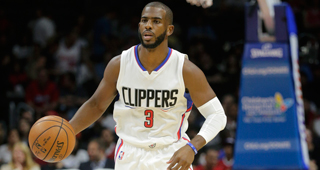We were going to view their playoff exit as quintessentially Clippers-like no matter what happened, but losing a first round Game 7 on their own conspicuously quiet home floor, with Blake Griffin out injured, and Paul Pierce doughily kicking in 22 minutes, relying on an iso-balling Jamal Crawford to bring them back from a double-digit deficit—that felt about right. A team that’s so talented and capable of producing basketball that’s both aesthetically heady and nerd-pleasingly efficient shouldn’t be defined by what’s depressing about them, but at the conclusion of each successive season, the Clippers bow out as an ever-deepening bummer. This most recent defeat didn’t evoke the gothic frustration of past years. It was just sad and ordinary, like not getting out of bed before sunset.
This is the fifth consecutive season the Clips have been eliminated by blowing a lead in a playoff series, and while that’s not a deeply illuminating stat, it is something no team has ever done before and gestures toward the Clippers’ specific brand of futility, which resides not in abject suckitude but in never quite being good enough—and in strange and specific self-defeat. Not long ago, they were convincingly posited as the most likely impediment to the then-emerging Warriors’ Western Conference hegemony. It made sense in theory—Chris Paul guards Steph Curry as well as anyone, and DeAndre Jordan is the kind of hyper-athletic big man who gives Golden State trouble—but in practice, the Clippers couldn’t hang, couldn’t even get to the point where they could challenge Steve Kerr’s Warriors in the postseason. A lot of distinct factors kept them from their imagined peak since Paul left New Orleans for Los Angeles: injuries, and Josh Smith hearing Jimi in the Western Conference Semis, and Donald Sterling doing a Jefferson Davis impression on tape, and Paul blowing it against the ‘14 Thunder, and Blake punching out a team staffer last year. You can explain each individual stumble, but in aggregate, they create the persuasive illusion that, in the end, some fundamental, putrid Clippers-ness always gets in their way.
Of course that’s not the case, but the Clips are going to have an only marginally less difficult time transitioning out of the dilapidated Lob City Era as they would changing the franchise’s historical identity. This offseason, they can sign Chris Paul, who turns 32 later this week, to a five-year contract worth $205 million, or let him walk. They have the same choice with Blake Griffin, for $175 million, though they might be able to send him elsewhere in a sign-and-trade and get a couple so-so assets in return. And if they want to keep J.J. Redick around, that’ll cost too.
There are no peace-granting answers here. It’s been said repeatedly over the past few years that Doc Rivers’ dubious talent acquisition skills have undermined the job he’s doing as a coach, but it’s striking when you look at Doc’s missteps in total: how he kept signing dudes who were last useful a half-decade ago—Big Baby Davis, Antawn Jamison, Hedo Turkoglu, et al.—and never found even an above-average fifth starter to slot in at the wing, let alone a handful passable board-crashers and defenders and three-point shooters to come off the bench. He wasted Chris Paul’s prime and the intermittent spells when Griffin was healthy and awesome by failing to put in the work to find D-Leaguers and late-round draft picks who might have been able to contribute to a championship contender. And now the Clips effectively have two choices: further cap themselves out on two stars whose best days are likely behind them, or admit defeat and start over.
Which way this decision goes has a lot to do with whether Doc sticks around. He won’t preside over a rebuild in Los Angeles, but there’s also a possibility he could skip town and take the vacant team president gig in Orlando. Doc’s a likable sort—when he’s not sourpussing referees, that is—but there’s some cut-and-run in him. He didn’t exactly try to make the marriage work in Boston. Perhaps that’s predictive.
Regardless of whatever direction the Clippers do move in, it’s a shame that the project hasn’t worked out as well as early optimists would have hoped. It’s easy to forget now, because it’s been buried beneath the memories of a million on-court scowls and gripings, but the potential for these Clips, at the moment of their conception, was vast not just in terms of gunning for titles but in terms of expressiveness and fun. The best point guard of his generation with two absurdly gifted high-flyers? That sounded terrific. Lob City wasn’t a marketing gimmick, or it didn’t start that way. It was something Blake Griffin said to his friend, DeAndre Jordan, when they learned the Clippers had swung the Chris Paul trade. He was happy, thinking about what a swell time the three of them would have playing together.
And they sort of did? For a while, and then it got unappetizingly sour. You can hear it in the tone folks are using when writing and speaking about whether the Clips will blow it up or extend Paul and Griffin another five years: most of us are moderately sick of them. They don’t get along particularly well. They bog down in the fourth quarter. Blake, after years of lousy injury luck, has lost some of what made him special. We know what the Clippers are, and we’re not aching to find out what dour death they’ll die next season. We probably won’t learn anything new, and we probably won’t be entertained. That won’t stop it from happening if it’s deemed to happen, but you wonder if the principals involved know this has gone on too long, if they can sense our collective weariness from afar. They must know too, on some level, that this isn’t working out the way they expected, and it never will.



